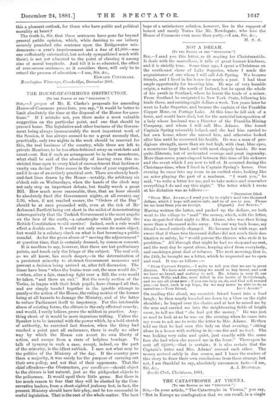THE HOUSE-OF-COMMONS OBSTRUCTION.
[To THE EDITOR OF THE "SPECTATOR."] 5is.„—.1 pn•opos of Mr. E. Clarke's proposals for amending House-of-Commons proce lure, you say, "It would be better to limit absolutely the time at the disposal of the House for ques- tions." If I mistake not, you there make a most valuable suggestion on the particular point, and one that should be pressed home. The legislative and other business of the Govern- ment being always immeasurably the most important work of the Session, it has always seemed to me a great anomaly that, practically, only two nights in the week should be reserved for this, the real business of the country, while three are left to private Members, to be too often frittered away on crotchets and counts-out. But if such an arrangement be in itself monstrous, what shall be said of the absurdity of leaving even this re- stricted time open to every kind of encroachment that faction or• vanity can devise? Here comes in the value of your suggestion, and it is one of an entirely practical sort. There are already hard- and-fast lines drawn by the House—notably, the arbitrary six .o'clock rule on Wednesdays, when the hands of the clock may not only stop an important debate, but finally wreck a great Bill. • How much more reasonable, then, that an hour should be absolutely fixed (for Government nights, at all events), say 5.30, when, if not reached sooner, the " Orders of the Day '' -should be at once proceeded with, even at the risk of Mr• Ashmead-Bartlett being cut short in the midst of demonstrating interrogatively that the Turkish Government is the most angelic on the face of the earth,—a catastrophe which probably the British Constitution would survive! Indeed, such a rule would effect a double cure. It would not only secure its main object, but would be a salutary check on what is fast becoming a public scandal. As for the gross abuse of " moving the adjournment" at question time, that is certainly doomed, by common consent.
It is needless to say, however, that these are but preliminary points, and touch only the fringe of the subject. The real evil, as we all know, lies much deeper,—in the determination of -a persistent minority to obstruct Government measures and prevent a decision being arrived at, after full discussion. The times have been " when the brains were out, the man would die," —when, after a fair, stand-up fight over a Bill, the vote would be taken, " and there an end." But the rowdy section of the Tories, in league with their• Irish pupils, have changed all that, and are simply banded together in the ignoble attempt to paralyse the action of the House, the ruling motive of the former being at all hazards to damage the Ministry, and of the latter to reduce Parliament itself to impotency. For this intolerable abuse of existing forms, the cloture is the only effectual remedy, and would, I verily believe, prove the mildest in practice. Any- -thing short of it would be mere ingenious trifling. Unless the Speaker is to be invested with the power which, by a bold stretch of authority, he exercised last Session, when the thing had reached a point past all endurance, there is really no other way by which the House can assert its own liberty of action, and escape from a state of helpless bondage. To talk of tyranny in such a case, except, indeed, on the part of the minority, is the idlest rubbish. I care not what may be the politics of the Ministry of the day. If the country gave them a majority, it was surely for• the purpose of carrying out their own policy, and not that of their opponents. That the chief offenders—the Obstructors, par excellence—should object to the cloture is bat natural, just as the pickpocket objects to the policeman. It would spoil their little game. But there is too much reason to fear that they will be abetted by the Con- servative leaders, from a short-sighted jealousy lest, in fact, the present Ministry should have fair-play, and be too successful in useful legislation. That is the root of the whole matter. The best
hope of a satisfactory solution, however, lies in the support of honest and manly Tories like Mr. Newdegate, who love the House of Commons even more than party.—I am, Sir, &c., H. S. S.






































 Previous page
Previous page